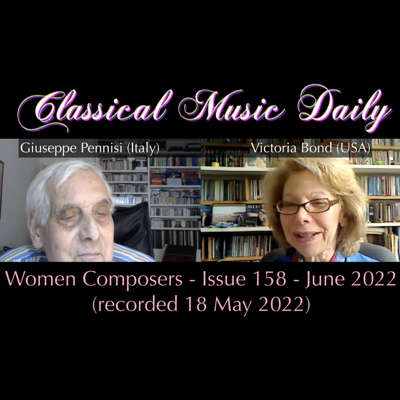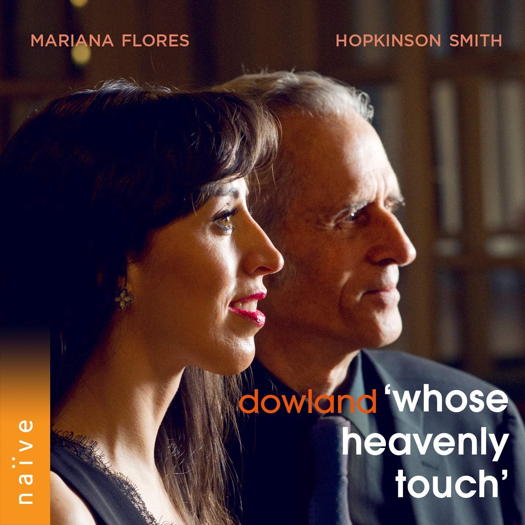- Susan Graham
- Alsace
- Glossa
- Yo-Yo Ma
- Béla Bartók
- Jacques Ibert
- Sir Donald Francis Tovey
- Chamber Music Adelaide
 VIDEO PODCAST: Women Composers - Our special hour-long illustrated feature on women composers includes contributions from Diana Ambache, Gail Wein, Hilary Tann, Natalie Artemas-Polak and Victoria Bond.
VIDEO PODCAST: Women Composers - Our special hour-long illustrated feature on women composers includes contributions from Diana Ambache, Gail Wein, Hilary Tann, Natalie Artemas-Polak and Victoria Bond.
 ASK ALICE: Weekly, from 2003 until 2016/17, Alice McVeigh took on the role of classical music's agony aunt to answer questions on a surprising variety of subjects.
ASK ALICE: Weekly, from 2003 until 2016/17, Alice McVeigh took on the role of classical music's agony aunt to answer questions on a surprising variety of subjects.

Deeply Humane
PATRICK MAXWELL listens to
music by John Dowland
'... the exquisite word-painting comes through brilliantly ...'
The music of John Dowland, although composed around the same time as Tallis and Byrd, has a unique feature in its historic popularity when first performed in the late sixteenth and early seventeenth centuries. The contemporary desire for melancholia in many forms, contrasted with spritely refrains, is expertly displayed in his music, which captured the public imagination in the seventeenth century and has an enduring impact in musical history to this day. The distinctly secular nature of these pieces gave them to the public at the time, and the falling fourth evident in many works was a popular feature of the lachrymose music.
This recording of the most well-renowned of Dowland's songs for voice and lute from Mariana Flores and Hopkinson Smith displays the importance of musical conversation and craftsmanship that is necessary to fulfill Dowland's graceful suspensions and modal progressions. Dowland's recent popularity is necessary; it is facile to neglect his music given how popular it was; Byrd and others have the advantage of their enduring church music, which demands performance through its liturgical significance and sheer majesty.
The most famous of the pieces begins the recording - with 'Flow my tears' tenderly produced, and at a sensible speed that allows for full relishing of the sonority that a plaintive A minor gives. This is repeated in the solemn 'I saw my lady weep', swiftly changed in the nervous 'Can she excuse my wrongs'. Throughout this, the exquisite word-painting comes through brilliantly, and Argentinian singer Mariana Flores notes how she took special care to make sure her English accurately represented the composer's intentions and their musical intonation.
Listen — John Dowland: Can she excuse my wrongs
(track 5, 0:00-0:46) © 2019 naïve :
The voice and the lute are brilliantly combined; creating a tender and yet evocative sound. The elegiac 'Now, o now, I needs must part' is tantalisingly produced, and gives a full voice to the falling scale from G major to the relative minor of E. The ensuing decorations complement the melody well, and produce a piece that is both deeply lamenting but not as forlorn as other pavanes. This is put against the uplifting 'Farewell: Farewell' of 'Wilt thou unkind thus reave me', in which the musical theme seems to give a bitter-sweet feel to the words.
Listen — John Dowland: Wilt thou unkind thus reave me
(track 13, 2:00-2:55) © 2019 naïve :
This is repeated in the brillante 'Come again!'. Although the singer is engulfed in 'endless misery', nevertheless she affirms that 'my faith is ever true'. The final song, 'Sorrow, sorrow stay', is the culmination of the anguish, bitterness, and despair that are recurrent themes in the deeply humane words of Dowland. The diminuendos and crescendos that both performers show adds to the poignancy of the last song, ending on a mournful major chord.
No hope, no help ther doth remaine,
But downe, down, down I fall,
And arise I never shall.
Listen — John Dowland: Sorrow, sorrow stay
(track 17, 2:25-3:05) © 2019 naïve :
After the superfluous, multi-layered music of Nicholas Ludford and William Cornysh in the pre-Reformation period, the new styles of Tallis and Byrd were more simple, but signified the high point of the English renaissance. Purcell, and perhaps Blow, would be the last to recapture this in different ways before it sunk into the abyss for hundreds of years, despite the minor efforts of some composers, mainly in churches. Dowland is the epitome of this style, and his music certainly touched a nerve in many at the time, with the tune of 'Flow my tears' spreading around Europe, becoming the most well-known song from England in the seventeenth-century.
Copyright © 9 November 2019
Patrick Maxwell,
Buckinghamshire, UK

CD INFORMATION - DOWLAND: 'WHOSE HEAVENLY TOUCH'


